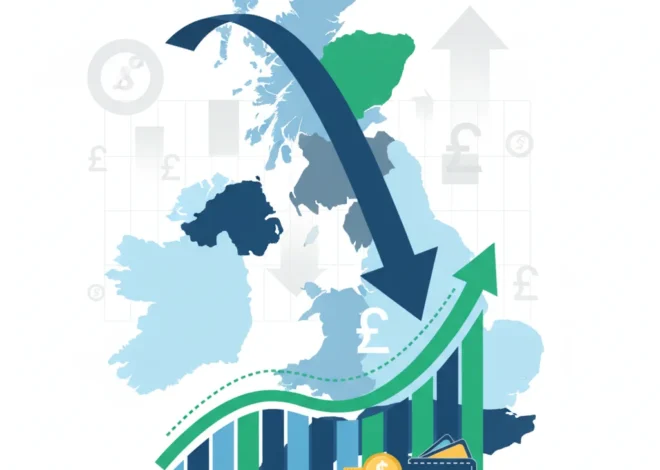
The £30bn Question: Is the UK Bracing for a New Era of Fiscal Reckoning?
In the quiet corridors of Westminster and the bustling trading floors of the City, a number is being whispered with increasing urgency: £30 billion. This isn’t the valuation of a new fintech unicorn or a blockbuster M&A deal. It’s the potential size of the fiscal black hole awaiting the next UK government. Shadow Chancellor Rachel Reeves recently acknowledged the stark reality, suggesting that a painful combination of spending cuts and tax rises is all but inevitable. This admission cuts through the pre-election noise, setting the stage for a period of profound economic adjustment.
For investors, business leaders, and indeed every citizen, this isn’t just political rhetoric. It’s a critical signal about the future direction of the UK economy. The decisions made in the coming months will ripple through every sector, influencing everything from the stock market and investment strategies to the health of the banking sector and the pace of financial technology innovation. Let’s delve into the anatomy of this fiscal challenge, explore the difficult choices on the table, and analyze the potential fallout for the UK’s economic landscape.
Decoding the £30 Billion Fiscal Challenge
The term “fiscal shortfall” can sound abstract, but its origins are painfully concrete. The UK, like many advanced economies, is grappling with a perfect storm of economic pressures. Sluggish growth, stubbornly high inflation, soaring debt interest payments, and immense pressure on public services have created a chasm between the government’s income (tax receipts) and its expenditure.
According to analysis cited by the Financial Times, this gap could be as large as £30bn, a figure that presents a monumental challenge for any incoming chancellor. This isn’t a problem that can be solved with minor tweaks or accounting tricks. It demands fundamental choices about the size and role of the state, the burden on taxpayers, and the priorities for national investment. The challenge is compounded by both major parties’ commitment to fiscal rules that aim to get national debt falling as a share of the economy, leaving very little room to manoeuvre.
This situation puts the UK’s economic policy at a critical crossroads. The path chosen will not only define the next parliamentary term but could also shape the long-term competitiveness of the nation’s economy and its attractiveness as a hub for finance and investment.
The Unpalatable Menu: Tax Rises vs. Spending Cuts
When faced with a shortfall of this magnitude, a government essentially has two levers to pull: increase revenue or decrease spending. Neither is popular, and both come with significant economic and political costs. Rachel Reeves has been clear that Labour will not raise income tax, national insurance, or VAT, but the scale of the problem suggests that other avenues must be explored. Below is a breakdown of the potential options and their implications.
| Policy Lever | Potential Targets & Examples | Potential Economic Impact |
|---|---|---|
| Tax Rises | Closing “loopholes” (e.g., non-dom status, private school VAT), aligning Capital Gains Tax with income tax, windfall taxes on energy or banking profits, “stealth taxes” via frozen income thresholds. | Could reduce the deficit and fund public services, but risks dampening investment, reducing consumer spending, and potentially slowing economic growth. Affects stock market sentiment. |
| Spending Cuts | Reductions in budgets for “unprotected” departments (e.g., Justice, Transport, Local Government), “efficiency savings” across the public sector, scaling back capital investment projects. | Lowers government expenditure and borrowing, potentially reassuring bond markets. However, it can lead to a decline in public service quality and hinder long-term productivity and growth. |
| A Hybrid Approach | A carefully balanced combination of targeted tax increases and strategic spending reviews to find efficiencies without deep cuts to frontline services. | Politically the most likely path. Aims to spread the burden and mitigate the harshest impacts of either extreme, but risks being seen as tinkering rather than transformative. |
The core dilemma is that the “easy” options have been exhausted. Freezing income tax thresholds, a form of “stealth tax,” has already pulled millions into higher tax brackets, a move known as fiscal drag. Further tax rises on capital or corporations could deter the very investment the UK needs to stimulate its economy. On the other side of the ledger, a decade of austerity has already squeezed many public services. The Institute for Fiscal Studies has warned that current spending plans imply significant cuts for many unprotected government departments, a fact that is rarely discussed on the campaign trail.
Implications for the Economy, Investing, and Financial Technology
The decisions made to plug this fiscal gap will have profound and far-reaching consequences. For those involved in finance, trading, and investing, understanding the potential impacts is crucial for navigating the road ahead.
The Impact on the Stock Market and Investment
Fiscal consolidation is often a headwind for equities. Higher taxes on corporations or individuals can reduce profits and disposable income, dampening demand and affecting company earnings. Sectors reliant on consumer discretionary spending could be particularly vulnerable. Conversely, spending cuts could negatively impact companies that rely on government contracts, from infrastructure and defence to outsourcing services. Investors will need to be highly selective, focusing on companies with strong balance sheets, international revenue streams, and pricing power that can withstand a period of domestic economic sluggishness. The UK’s Gilt market will be a key barometer of investor confidence in the government’s fiscal plan, with yields directly impacting borrowing costs across the economy.
The Future of Banking and Fintech
The UK’s status as a global leader in finance and financial technology could also be tested. A prolonged period of low growth and higher taxes could make the UK a less attractive place to start and scale a business. While the banking sector might benefit from higher interest rates in the short term, a weak underlying economy is a long-term negative. For the vibrant fintech sector, a reduction in public funding for R&D or investment incentives could slow innovation. However, there is a silver lining. A government desperate for efficiency may turn to financial technology solutions to modernise public services, creating new opportunities. Technologies like blockchain could be explored for enhancing transparency and efficiency in public finance, though this remains a long-term prospect. The immediate focus will be on how the economics of the country support or hinder this innovative sector. As Reeves noted, a stable economic foundation is a prerequisite for growth, a sentiment that resonates deeply within the tech community.
The Broader Economic Picture
The greatest risk is that a sharp fiscal consolidation could tip an already fragile economy into recession. This is the classic “paradox of thrift” on a national scale: if the government, businesses, and consumers all cut back at the same time, demand collapses, growth evaporates, and the deficit problem can actually worsen. The alternative argument is that failing to address the deficit would lead to a loss of market confidence, higher borrowing costs, and an even more painful economic adjustment down the line. Navigating this tightrope will require immense political skill and a clear-eyed view of the state of the global economy.
Conclusion: A Defining Moment for the UK
The looming £30bn fiscal shortfall is more than a headline number; it’s a defining challenge that will shape the UK’s economic trajectory for years to come. The era of easy money is over, and the next government, regardless of its political stripe, will be forced to make choices that will have a real and lasting impact on public services, household finances, and the investment landscape.
For finance professionals and business leaders, the coming months demand vigilance and strategic foresight. The first 100 days of the new administration, culminating in its first Budget or Autumn Statement, will be critical. The plans laid out will send a powerful signal to the international investment community about the UK’s commitment to fiscal stability and its strategy for long-term growth. The path to a sustainable fiscal future will be difficult, but transparency, credibility, and a clear plan will be the essential currencies for navigating the turbulent economic waters ahead.


